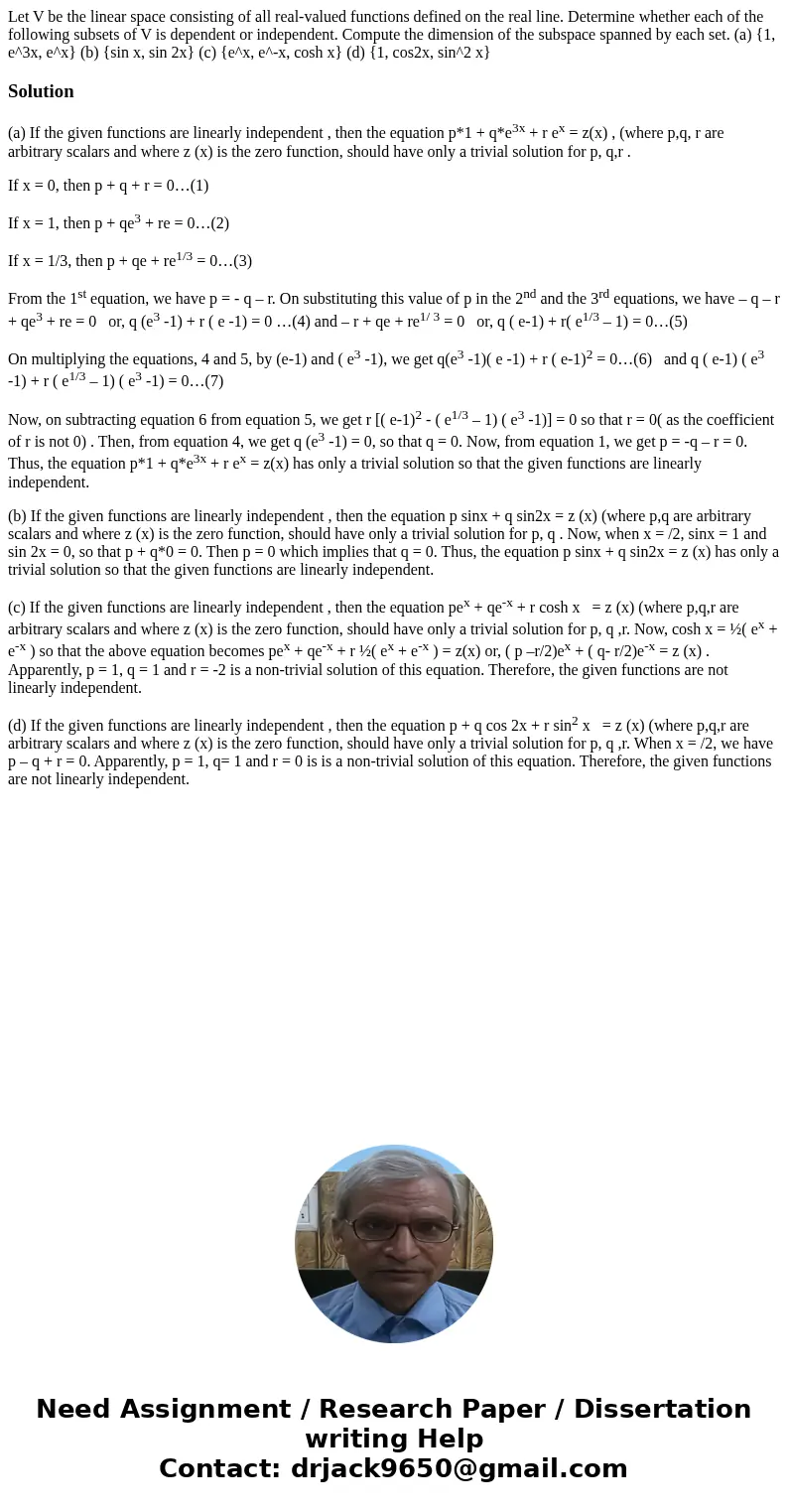Let V be the linear space consisting of all realvalued funct
Solution
(a) If the given functions are linearly independent , then the equation p*1 + q*e3x + r ex = z(x) , (where p,q, r are arbitrary scalars and where z (x) is the zero function, should have only a trivial solution for p, q,r .
If x = 0, then p + q + r = 0…(1)
If x = 1, then p + qe3 + re = 0…(2)
If x = 1/3, then p + qe + re1/3 = 0…(3)
From the 1st equation, we have p = - q – r. On substituting this value of p in the 2nd and the 3rd equations, we have – q – r + qe3 + re = 0 or, q (e3 -1) + r ( e -1) = 0 …(4) and – r + qe + re1/ 3 = 0 or, q ( e-1) + r( e1/3 – 1) = 0…(5)
On multiplying the equations, 4 and 5, by (e-1) and ( e3 -1), we get q(e3 -1)( e -1) + r ( e-1)2 = 0…(6) and q ( e-1) ( e3 -1) + r ( e1/3 – 1) ( e3 -1) = 0…(7)
Now, on subtracting equation 6 from equation 5, we get r [( e-1)2 - ( e1/3 – 1) ( e3 -1)] = 0 so that r = 0( as the coefficient of r is not 0) . Then, from equation 4, we get q (e3 -1) = 0, so that q = 0. Now, from equation 1, we get p = -q – r = 0. Thus, the equation p*1 + q*e3x + r ex = z(x) has only a trivial solution so that the given functions are linearly independent.
(b) If the given functions are linearly independent , then the equation p sinx + q sin2x = z (x) (where p,q are arbitrary scalars and where z (x) is the zero function, should have only a trivial solution for p, q . Now, when x = /2, sinx = 1 and sin 2x = 0, so that p + q*0 = 0. Then p = 0 which implies that q = 0. Thus, the equation p sinx + q sin2x = z (x) has only a trivial solution so that the given functions are linearly independent.
(c) If the given functions are linearly independent , then the equation pex + qe-x + r cosh x = z (x) (where p,q,r are arbitrary scalars and where z (x) is the zero function, should have only a trivial solution for p, q ,r. Now, cosh x = ½( ex + e-x ) so that the above equation becomes pex + qe-x + r ½( ex + e-x ) = z(x) or, ( p –r/2)ex + ( q- r/2)e-x = z (x) . Apparently, p = 1, q = 1 and r = -2 is a non-trivial solution of this equation. Therefore, the given functions are not linearly independent.
(d) If the given functions are linearly independent , then the equation p + q cos 2x + r sin2 x = z (x) (where p,q,r are arbitrary scalars and where z (x) is the zero function, should have only a trivial solution for p, q ,r. When x = /2, we have p – q + r = 0. Apparently, p = 1, q= 1 and r = 0 is is a non-trivial solution of this equation. Therefore, the given functions are not linearly independent.

 Homework Sourse
Homework Sourse